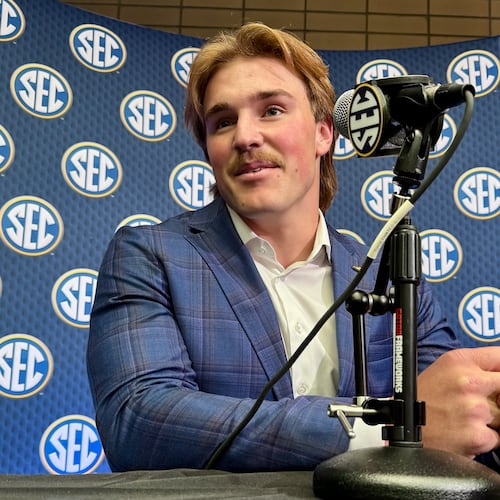The run of conference media days means that college football teams are nearing the start of actual practice. (Actual games are still five weeks away.) Any day now, we’ll see the unveiling of this year’s preseason polls, and as someone who compiles his own set of rankings I’ll hazard the guess that Alabama and Clemson will be 1-2 if not 2-1.
Which would, you’d think, make sense. Alabama is the defending champ, not to mention the nation’s flagship program. Clemson lost narrowly in the title game and returns the nation’s best quarterback in Deshaun Watson. Any card-carrying ranker will tell you that’s where you start — with teams that were really good last year and especially those with a proven quarterback. But, as a ranker with an eye for history, I wonder if that’s really the way to go.
Consider: Only once in the 16 years of the BCS or the first two editions of the College Football Playoff has a team repeated as undisputed champ — Alabama in 2011 and 2012. USC finished atop the Associated Press poll in 2003, but didn’t play for the BCS title, which it would win the next season. Not since those 2004 Trojans has a team ranked No. 1 in preseason finished No. 1, and each of the past 11 preseason No. 1’s featured a returning quarterback.
In 2005, defending champ USC had Matt Leinart, who’d just won the Heisman Trophy. His Trojans received 60 of 78 votes in the preseason AP poll but were upset in the Rose Bowl by Texas and Vince Young, the best player never to hold a Heisman. In 2009, reigning BCS champ Florida had Tim Tebow, another Heisman winner, and received 58 of 60 No. 1 votes in preseason; the Gators were upset by Alabama in the SEC title game.
In 2010, the aforementioned Alabama returned Greg McElroy and received 54 of 60 No. 1 votes; the Crimson Tide lost three games, the last coming against Auburn, which would succeed its rival as BCS champ behind Cam Newton, who won the Heisman in his only season as a Tiger. Something similar happened in 2013: Alabama drew 58 of 60 No. 1 votes and returned AJ McCarron, twice a national champ. The Tide were upset by Auburn, which had a first-year starting quarterback in Nick Marshall and was in turn beaten by Florida State, which saw redshirt freshman Jameis Winston take the Heisman.
A year later, the Seminoles drew 57 of 60 No. 1 votes, but were beaten in the playoff semis by Oregon, which lost to Ohio State and third-string quarterback Cardale Jones. The newly crowned Buckeyes — with three No. 1 quarterbacks in Jones, Braxton Miller and J.T. Barrett — then became the first unanimous preseason No. 1; they lost to Michigan State and didn’t make the playoff. Alabama won behind Jake Coker, a fifth-year senior and first-time starter.
If we draw any conclusion from that narrow slice of recent history, it’s this: National champs tend to have a new starting quarterback. Of the past six titles, five were won by teams with a first-year starter. (The exception being Alabama in McCarron’s second year.) That sounds counter-intuitive — successful seasoned quarterbacks are the sport’s most valued currency — but much about college football is counter-intuitive.
Alabama will have yet another first-year starter at quarterback this season, but we’ve just mentioned that reigning champs — even if they’re overwhelming favorites, as those cited above were — tend not to repeat. Clemson has Watson, whom Nick Saban has called the best collegian since Newton. Oklahoma returns Baker Mayfield from its playoff team. Ohio State still has Barrett. Tennessee has Joshua Dobbs. But who among contenders might ride the first-year lightning?
Well, Florida State might. Or Michigan might. And Georgia does have Jacob Eason. Not predicting as much, mind you. Just sayin’.
About the Author
Keep Reading
The Latest
Featured


